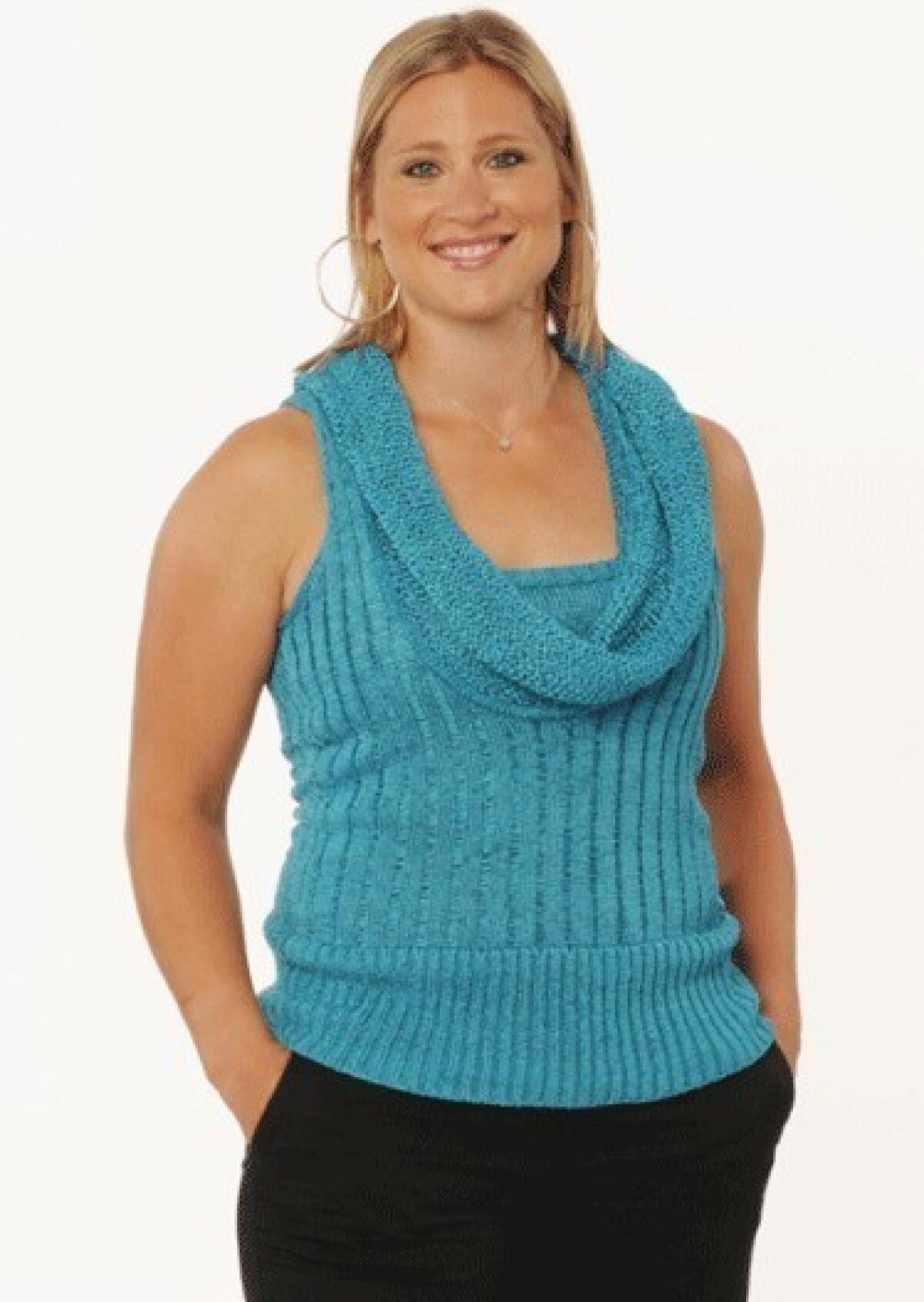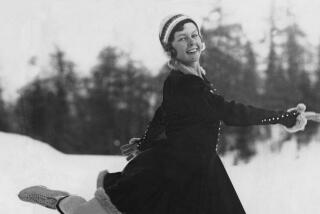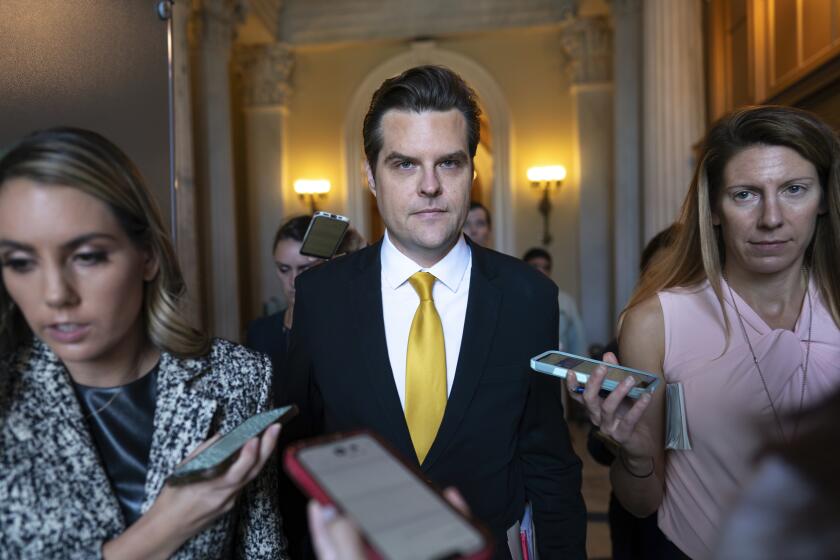London calling for Olympian Angela Ruggiero

Valley native and four-time ice hockey Olympic medalist Angela Ruggiero â one gold, two silvers, one bronze â was elected in 2010 by her fellow Olympians to the Athletes Commission of the International Olympic Committee. Sheâs one of 12 athletes designated to speak for the wrestlers, runners, swimmers, skaters and all the other competitors in the hierarchy that governs the Games. Next weekâs London Olympics are her first as a member of the IOC, but sheâs already working far ahead: on the 2018 Winter Games in South Korea, on the 2016 youth Olympics in Lillehammer, Norway, and on her MBA at Harvard, her alma mater. The proponent of womenâs sports is off the competitive ice but on the larger Olympic team.
What will you be doing in London at the Games?
We have meetings the week before. Iâll get to run the torch in one of the boroughs, Richmond upon Thames. Iâm going to try to get to as many events as possible. And I get to give out medals. I donât know which yet; Iâm a newer member, so I wait to see what events are left after the senior members select.
The amount of detail that goes into planning the Olympics has been surprising. As an athlete, you show up and everything is great and you have everything you need, and you donât really think about all the work that goes into it. Being a member now and seeing plans that were developed 10 years out is pretty incredible.
Questions have been raised in Britain about whether there is adequate security for the Games. Has the IOC talked about this?
We get daily briefings, but Iâm not concerned at all. I leave on Saturday; Iâm confident in London, and I know theyâll do a really good job.
You retired from the U.S. ice hockey team and international competition in December. Was it hard to hang up your skates?
Yeah, Iâve been playing hockey since I was 7, so to step away from it, thereâs a bit of a void. I told my team that I will be in Sochi [Russia, site of the 2014 Winter Olympics] cheering you on, and I hope Iâm the one who gets to give you your gold medal!
How about those Kings, winning the Stanley Cup?
It was my childhood dream to see them win. I wanted to be on the Kings when I was little. There was no womenâs Olympics [hockey], and I didnât really see womenâs NCAA hockey because it was all on the East Coast, so the Kings were it for me.
California has three NHL teams, more than any other state. When I started playing, there were [only] a half-dozen rinks. Now there are many more rinks, yet it is harder [than] walking to a soccer field and picking up a ball. It takes lots of dedication on the parentsâ part and the kidsâ part. With the success of the Kings, hopefully a lot of young kids were inspired.
Is it true you went to second-grade Career Day dressed as a hockey player?
White Oak Elementary [in Simi Valley]. I showed up in my gear. No one had seen that before.
Itâs the 40th anniversary of Title IX, which bans discrimination against women in education, including school sports.
Everyone in womenâs sports in the U.S. is indebted to Title IX. The government really took a stand: Of course we should provide equal opportunity. People all the time ask, why do American women do so well in the Olympics? And I point to Title IX.
Encouraging women to play sports has had other benefits too.
You earn higher wages, you have more confidence, youâre less prone to domestic violence, have better eating habits, lower obesity.
Sport in general is a universal right, in my opinion. Everyone should have the opportunity to try sport, to try activities that lead to healthier living.
Yet London is the first Olympics in which every competing country will include women on its team.
Saudi Arabia opening the doors to women this summer is super exciting. I met a young woman who competed in the youth Olympics in equestrian for Saudi Arabia, and she medaled. She wants her dream to come true.
In 1972, the year of Title IX, IOC President Avery Brundage observed that the ancient Greeks may have had the right idea â they didnât even let women watch the games.
Obviously change takes time and patience. Finally, in Sochi, women will compete in ski jumping, and in Rio [at the 2016 Summer Olympics], youâll have womenâs boxing, womenâs golf, womenâs rugby. Theyâre making a push to make sure every sport has a menâs and womenâs division. Itâs about participation, about equal opportunity. Itâs a blueprint of what you value.
Some say female athletes just arenât as good as the men.
You can only climb as high as the ladder is high. I competed in a menâs professional hockey game a few years ago. That was a great opportunity for me to get out there and prove that I belonged. Iâll never compare to a [Zdeno] Charaof the [Boston] Bruins, whoâs almost 7 foot. Iâd be tiny compared to him, and Iâm one of the bigger players in my game. But as far as skill â .
Give the same time [and resources] for each team and each athlete to succeed. Women compete at the NCAA level; they have four years of great training and development, [but] then if they donât have the same opportunities as the men when they graduate, they canât continue to develop as an athlete. Therefore the level of womenâs sports is actually stunted, in my opinion.
For example, a male hockey player plays 70, 80 games in a pro season; theyâre skating all summer; they have the financial means to only play hockey; they have everything they need to become the best hockey players in the world. The womenâs semi-pro league, our schedule is maybe 20 or 30 games, so on top of not having the same coaching and salary and other things, youâre not playing at as intense a level so you canât push the boundaries the same way men can.
IOC President Jacques Rogge recently said womenâs Olympic hockey âcannot continue without improvement.â Many people interpreted that as a criticism of North American dominance of that sport.
His comments, I think, were more to encourage the International Ice Hockey Federation to support womenâs hockey. The teams that have great menâs programs should have great womenâs programs. So in Russia or the Czech Republic or other nations that donât support their womenâs teams or have poor womenâs teams, theyâre simply allocating their resources for the men and leaving nothing for the women. He wasnât saying weâre going to get rid of [Olympic] womenâs hockey. It was more, âListen, these countries really need to support their womenâs teams.â
Youâre president-elect of the Womenâs Sports Foundation, which is running a public service campaign called âKeep Her in the Game.â
The campaign is saying girls drop out [of school sports] at twice the rate of boys by age 14. The PSA shows a girl on the soccer field, ready to kick the ball, and a loudspeaker comes on shouting all these things that girls get pressured about: how they look in their jeans, their boyfriends, all this peer pressure that boys donât have to the same degree. And then you see her walking off the field.
You got a bachelorâs degree in government at Harvard; will you be running for office one of these days?
Iâm interested in government. Iâm going back [to Harvard] to get my business degree in the fall. Whenever I talk to kids, I say, sports is important, but you need to get your homework done before practice. Itâs hard for me to see young athletes whoâve put all their eggs in one basket and donât succeed on the field.
You were on âThe Apprentice.â You didnât win but Donald Trump offered you a job. Would you take him up on it?
He sent me a really nice note after I retired, wishing me the best. Maybe sometime in the future, but right now my focus is on school.
After you won your first Olympic gold medal in Nagano in 1998, you were barred from playing in a pickup game at a public rink in Michigan that had a men-only rule.
I thought it was a joke. I had my $5 to get on the ice; I was willing to change in the bathroom; they said no. So I contacted Fox 2 News and went back [with] an undercover camera and got them saying that on camera. I went back after they changed the rules. I had 10 goals [against] a bunch of beginner men. It wasnât even the hockey; it was the principle of it.
One reason Iâve been successful, I think, was because I was cut from a boysâ all-star team when I was little because they didnât want a girl. I was 9, playing in Pasadena, they put together an all-star team going to Canada, and I had to stay home. It was, like, we donât want a girl on the team. It actually made me a better hockey player in the long run because from the age of 9 I was determined. I made the national team when I was 15 years old.
I read that years ago you were in an exhibition game in Canada and some guy in the stands yelled, âSheâs nuts, sheâs gorgeous, sheâs my girl.â A lot of male fans wore your jersey.
When I see a man with my jersey on, thatâs awesome; he respects me as a hockey player, not as a female hockey player.
If you could talk to the parents of girls in elementary school about sports, what would you say?
I would say the same thing to parents of a boy or girl: Understand the importance of getting your kids active at a very young age, not only for their health and education but the way they view themselves, the way they view others. Itâs going to help them in so many areas of life. Especially young girls: Even though thereâs not a multimillion-dollar [sports] contract on the horizon, [for] the intangibles, support them like they would their sons.
This interview was edited and excerpted from a tape transcript.
More to Read
A cure for the common opinion
Get thought-provoking perspectives with our weekly newsletter.
You may occasionally receive promotional content from the Los Angeles Times.











